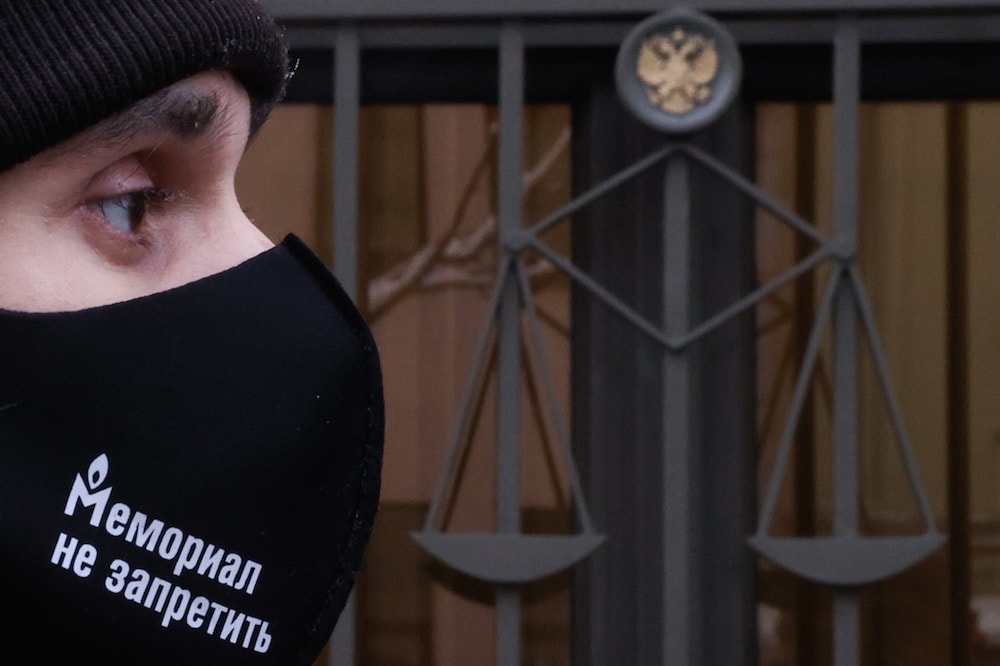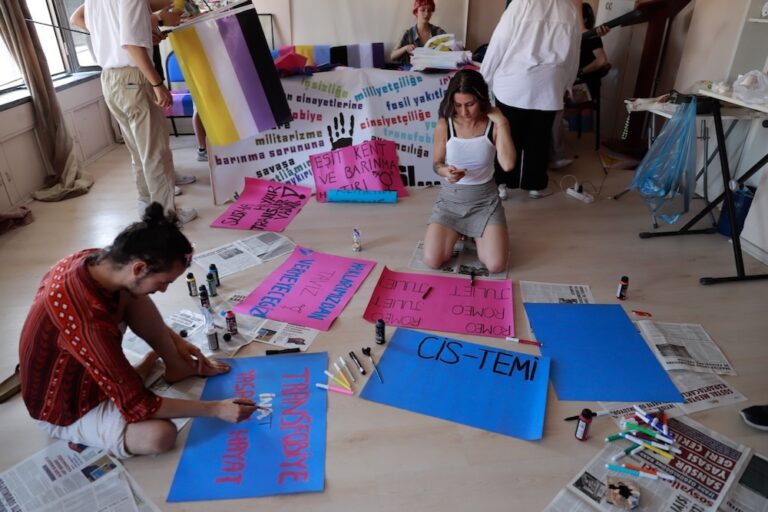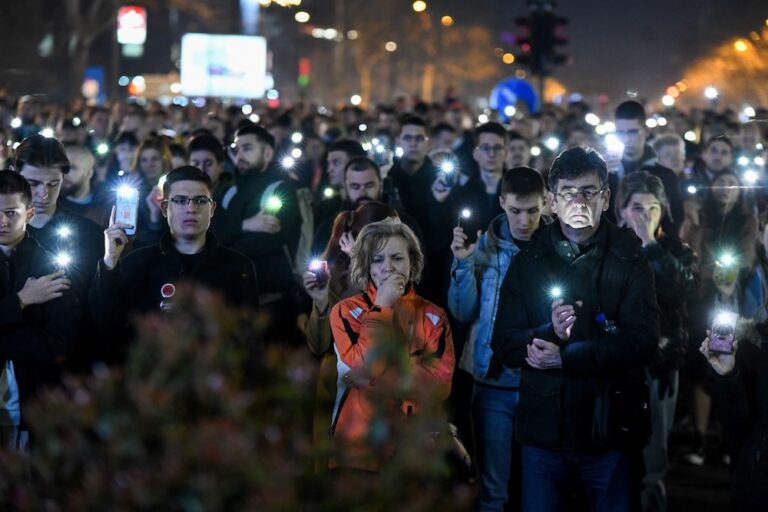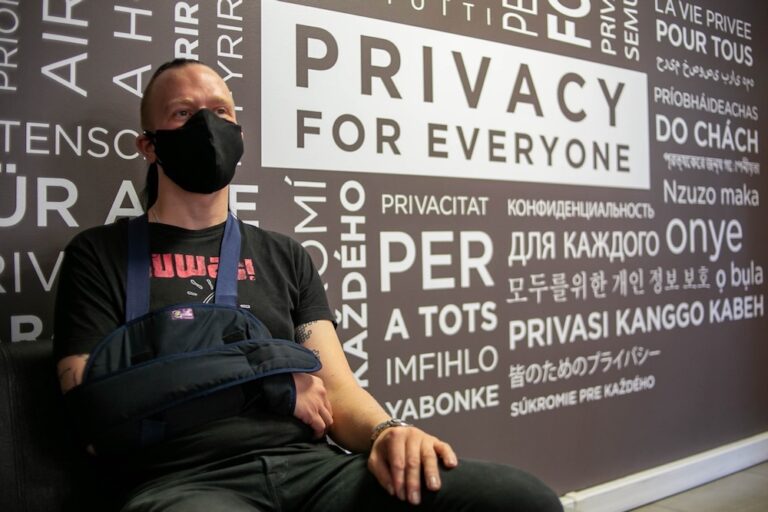December 2021 in Europe and Central Asia: A free expression round up produced by IFEX's Regional Editor Cathal Sheerin, based on IFEX member reports and news from the region.
The end of 2021 saw alarming assaults on civil society in Russia, Azerbaijan and Belarus, as well as the undermining of fundamental rights in the UK. But it also saw a welcome conviction in the case of a Belgian journalist who had suffered nine years of misogynistic harassment online, and a presidential veto of the “Lex-TVN” bill in Poland.
Russia: Dismantling civil society
In Russia, the final days of 2021 saw courts order the liquidation of two of the country’s most prominent and prestigious rights groups: International Memorial, which works to commemorate victims of Soviet repression, and its sister-organisation Human Rights Centre Memorial, which documents rights abuses. Both organisations were alleged to have violated Russia’s so-called “foreign agents” law. The decisions were met with international outrage and the European Court of Human Rights ordered Russia to suspend the closure of both groups.
The liquidation orders represent yet another attack on civil society in Russia, which over the last year has seen a big uptick in “foreign agent” designations (111 entities and individuals are currently on the list), and also a doubling down on internet censorship. One notable victim of both trends is the legal aid NGO, OVD-Info, which is partially-funded by Human Rights Centre Memorial, and which was designated as a “foreign agent” in September 2021. On 25 December, Russia’s internet and media regulator blocked the organisation’s website, allegedly because it carried “propaganda of extremism and terrorism”.
The authorities’ increasing determination to restrict internet freedom saw another ominous development in December, when a Putin ally acquired VK, the country’s most popular social network. The authorities had pressured the previous owners of the platform for access to users’ data (in particular, for information about Ukrainians who supported the 2014 ouster of Ukrainian President Yanukovych), and this latest development, writes PEN America’s Polina Sadovskaya, risks “putting the data of a hundred million Russians directly in the government’s hands”.
Azerbaijan: Authorities to decide who is a journalist
On 30 December, Azerbaijan’s parliament adopted a new media law that greatly restricts media freedom and effectively gives the government the power to decide who is a journalist.
Under the law the state will create a registry of journalists, who will have to meet unspecified criteria in order to be recognised as journalists; the authorities will then have access to their addresses and details of their bank accounts and work contracts.
Media outlets will also have to be registered in Azerbaijan to work there, meaning that correspondents working for exiled media groups (such as the independent Meydan TV) will be breaking the law if they report from inside the country.
Additionally, the new law bans journalists from disseminating information that is not from an official source, and requires their reporting to be “objective”.
Poland: “Lex-TVN” bill vetoed
Late December saw welcome news when President Andrzej Duda of Poland announced that he would veto the so-called “Lex-TVN” amendment, passed by the lower house of parliament earlier in the month. Although the legislation was presented as an attempt to protect Polish media from foreign takeovers, IFEX and others – in calling on Duda to use his veto power – argued that it was actually a direct attack on the independence of the US-owned channel TVN, and a “fundamental threat to media freedom”. Many thousands had joined rallies across Poland to protest the amendment.
December also saw revelations that three Polish opposition figures, including Senator Krzysztof Brejza, had been victims of phone-hacking using Pegasus spyware during the final weeks of the 2019 parliamentary elections. During the election campaign, state TV aired doctored text messages stolen from Brejza’s phone as part of a smear campaign.
Belarus: Raids and heavy sentences
According to the Belarusian Association of Journalists (BAJ), 2021 saw 113 journalists arrested in Belarus, 32 of whom were still detained at the end of the year.
December was a month of heavy sentencing, seeing independent bloggers and members of the political opposition handed extremely lengthy jail terms on highly dubious charges. Those sentenced included Siarhei Tsikhanouski, a popular video blogger and husband of the exiled opposition leader Sviatlana Tsikhanouskaya; he received an 18-year sentence. Bloggers Eduard Palchys and Ihar Losik, both of whom had already been in detention for well over a year, were handed prison sentences of 13 and 15 years respectively.
The month began with another wave of raids targeting rights activists and journalists. In mid-December, Radio Free Europe/Radio Liberty’s (RFE/RL) Belarusian service was added to the government’s growing list of “extremist” organisations, meaning that Belarusians who subscribe to the service could face up to six years in prison. Shortly after RFE/RL’s new status was announced, one of its correspondents – Aleh Hruzdzilovich – was detained by masked men who broke into his home in Minsk.
IFEX members and other rights groups saw the fruit of their labour in December when the UN Working Group on Arbitrary Detention recognised former NEXTA blogger Raman Pratasevich as arbitrarily detained and called on the international community to press Belarus for his release. Pratasevich is currently under house arrest in an unknown location and faces up to 15 years in prison on charges of “organising mass riots”. It was revealed in December that his girlfriend, Sofia Sapega, with whom Pratasevich was arrested after Belarus forced their Ryanair flight to divert to Minsk in May 2021, faces six years in prison on charges of inciting social hatred, damaging information security, mishandling private data, and threatening law enforcement.
For more on the state of media freedom in Belarus at the end of 2021, please take a look at BAJ’s recent overview.
UK: An assault on fundamental rights
On Human Rights Day (10 December), the UK High Court ruled that Wikileaks’s founder Julian Assange can be extradited to the US, where he faces up to 175 years in prison for publishing information in the public interest. The ruling, which overruled a previous decision not to allow Assange’s extradition on grounds of his poor mental health, was harshly criticised by Reporters Without Borders and the International Press Institute who continue to call for the publisher’s release. Assange’s lawyers will appeal.
The UK’s populist conservative government is currently pushing draft legislation that threatens fundamental rights – including the rights to freedom of expression and assembly – and which has been described as “an assault on democracy”:
- The draconian Policing Bill would radically curtail the right to protest; it includes protest-banning orders with catch-all definitions that would leave many protesters vulnerable to prosecution. It also includes an expansion of Police stop and search powers and makes an offence of “locking-on” (whereby protesters chain or glue themselves to their place of protest), with offenders facing up to 51 weeks in prison.
- The Nationalities and Borders Bill would allow the government to remove a person’s British citizenship without prior notice if such a move was considered to be in the “national interest”, or in the interests of national security, and if the government believed that the person in question was eligible for foreign citizenship. Such powers are likely to disproportionately affect minority ethnic groups, and especially Muslims. The legislation would also criminalise undocumented asylum seekers and penalise refugees entitled to asylum who arrive in the UK without prior permission.
- The dismantling of the UK Human Rights Act. In December, the Secretary of State for Justice, Dominic Raab, launched a consultation on a new bill of rights. The government’s proposals – which Raab has said will counter “wokery and political correctness” – will, among other things, introduce a permission stage to “deter spurious human rights claims”, allow judges to override rulings from the European Court of Human Rights, and expedite the deportation of foreign criminals.
Turkey: Council of Europe presses for release of Osman Kavala and Selahattin Demirtaş
In early December, the Council of Europe’s Committee of Ministers began infringement proceedings against Turkey for its continued failure to abide by a European Court of Human Rights (ECtHR) ruling that Osman Kavala be released. The civil society leader has been held in pre-trial detention on spurious charges since 2017. The Committee also called on Turkey to release jailed Kurdish politician Selahattin Demirtaş in line with another ECtHR ruling. Apparently confusing the Council of Europe with the European Union, President Erdoğan said he did not recognise “decisions taken by the European Union about Kavala [or] Demirtaş”.
The trials and persecution of journalists in Turkey continue unabated, though there are some small moments of justice. Mid-December saw the ECtHR rule that the Turkish authorities arbitrarily arrested journalist Nazlı Ilıcak and violated her right to freedom of expression when they jailed her on baseless coup-related charges in 2016. The Court ordered Turkey to pay Ilıcak 16,000 euros in compensation for her imprisonment (which lasted until 2019).
It was reported in December that the Radio and Television Supreme Council (RTÜK) had imposed a total of 71 fines on TV channels critical of the government in 2021. The total amount of fines issued was 1.5 million euros. No financial penalties were imposed on pro-government channels.
It was also revealed in December that Turkey has frozen the assets of 770 individuals alleged to have terrorist affiliations, including academics, activists and several journalists living in exile.
In brief
On 21 December, a court in Belgium sentenced a man to ten months in prison (with probationary reprieve following training on violence against women), as punishment for the more than nine years he spent subjecting journalist Myriam Leroy to misogynistic and anti-Semitic abuse online. He will also have to pay her 3,000 euros in compensation.
In North Macedonia, December saw a court hand a man a suspended jail sentence after he posted hate speech and threats against reporters on the Facebook page of the Association of Journalists of Macedonia. It’s a significant development because the authorities have a history of either ignoring threatening messages and hate speech directed at the press, or of treating the perpetrators lightly. Journalists and NGOs are frequently the target of online harassment and threats of violence, much of it instigated by political parties. Employees of Metamorphosis are currently being subjected to a campaign of online harassment and death threats, which began after the organisation – which works to combat disinformation – was falsely accused of deleting others’ content from Facebook in North Macedonia.
In Georgia, authorities have failed to release the autopsy results after the death of TV cameraman Aleksandre “Lekso” Lashkarava, who was found dead at his home in July 2021. Lashkarava died shortly after suffering serious injuries inflicted by far-right thugs at an anti-LGBTQI+ rally on 5 July 2021. The authorities, who originally claimed that the cameraman died of a drug overdose, have been criticised by press freedom advocates for failing to adequately protect the more than 50 journalists who were assaulted at the rally. The European Federation of Journalists lists Lashkarava as one of the six journalists who were killed in Europe in 2021.



